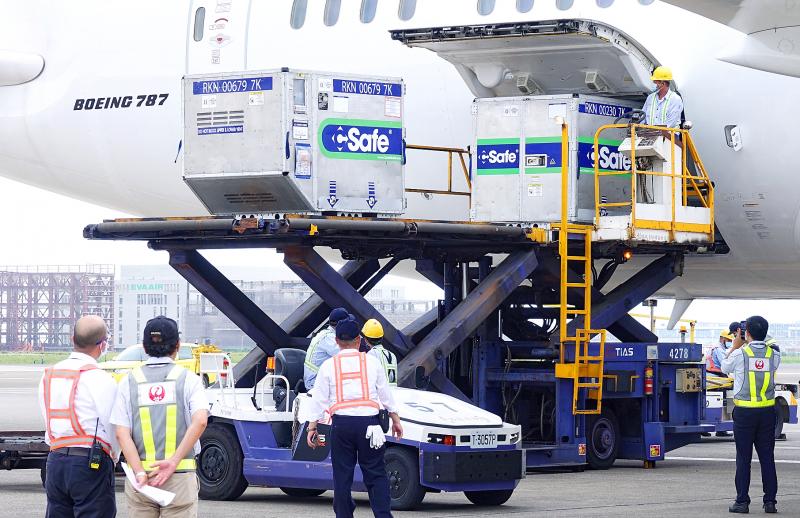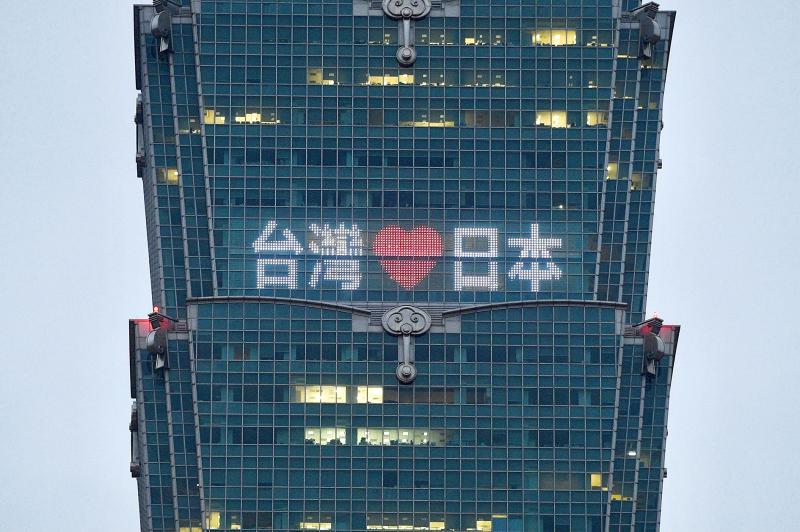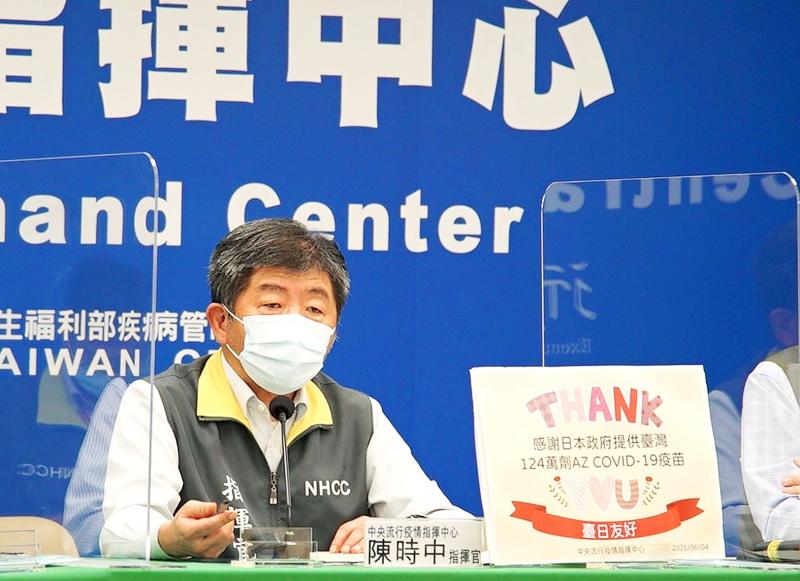A shipment of 1.24 million doses of the AstraZeneca COVID-19 vaccine from Japan yesterday arrived in Taiwan, with the flight reportedly accompanied by a US military aircraft, while Washington announced its plan to share vaccine doses with allies, including Taiwan.
It is the largest amount of vaccine doses received by Taiwan in a single shipment, Minister of Health and Welfare Chen Shih-chung (陳時中) told a daily news briefing at the Central Epidemic Command Center (CECC) in Taipei.
The doses would be effective through Oct. 14, Chen said.

Photo: Liu Hsin-de, Taipei Times
Chen thanked Japan for offering Taiwan timely help, instead of sending the doses to COVAX, the global vaccine sharing program.
It would take more time to acquire vaccines through the platform, he said.
Chen, who heads the CECC, said the center two days ago had received Japan’s technical documentation for the doses, which would help hasten its examination process, adding that health personnel would inspect the doses before supplying them to the public.

Photo: George Tsorng, Taipei Times
The tranche, transported by Japan Airlines Flight JL809, departed from Tokyo’s Narita International Airport at 11am and landed at Taiwan Taoyuan International Airport at about 2pm.
Originally a regular passenger flight between Tokyo and Taoyuan, the flight was canceled to transport the vaccine doses.
Before its departure, Representative to Japan Frank Hsieh (謝長廷) shared on Facebook several photographs of airport personnel loading boxes in heavy rain, including a photo of Hsieh in a raincoat bowing to the plane.

Photo provided by the Central Epidemic Command Center
The deal was reached through the efforts of Hsieh and Joseph Young, charge d’affaires ad interim at the US embassy in Tokyo, who met on Monday last week, as well as former Japanese prime minister Shinzo Abe, Democratic Progressive Party Legislator Wang Ting-yu (王定宇) said, echoing a similar account from Japan’s Sankei Shimbun.
“Taiwan always accompanies Japan through pain or agony,” Japanese Representative to Taiwan Hiroyasu Izumi said in a statement in Mandarin.
While both countries struggle amid COVID-19 outbreaks, Japanese sincerely hope to support Taiwanese to repay their aid in the wake of the 2011 Great East Japan Earthquake and at the onset of the pandemic last year, when Taiwan donated 2 million masks and other medical supplies to Japan, he said.
Japan’s timely aid to Taiwan on the 32nd anniversary of the Tiananmen Square Massacre boosts the nation’s confidence in its democracy, President Tsai Ing-wen (蔡英文) wrote on Facebook.
The White House on Thursday detailed its plan to distribute 25 million vaccine doses, the first of 80 million it plans to share worldwide by the end of the month.
White House COVID-19 response coordinator Jeff Zients said that the first tranche would be comprised of a combination of three vaccines that have US emergency use authorization: Johnson & Johnson, Moderna and Pfizer-BioNTech.
Nearly 19 million doses would be shared through COVAX, including 7 million allocated for Asia, including Taiwan, Afghanistan, Bangladesh, India, Indonesia, Laos, Malaysia, Maldives, Nepal, Pakistan, Papua New Guinea, the Philippines, Sri Lanka, Thailand and Vietnam, it said, without specifying the amount to each nation.
About 6 million doses are allocated to nations in South and Central America and the Caribbean, including Argentina, Brazil, Colombia, Costa Rica, Guatemala, Haiti and Peru.
Five million are reserved for Africa and would be distributed in coordination with the African Union, US National Security Adviser Jake Sullivan said.
“But ultimately, the United States will have the authority to say the doses are going here as opposed to there,” he added.
US President Joe Biden said that the remaining 6 million doses of the initial donation would be shared directly with countries experiencing surges or that are in crisis, as well as with partners and neighbors such as Canada, Mexico and South Korea.
Sullivan said that the US wants to “retain some flexibility” about allocating doses outside COVAX as necessary.
The American Institute in Taiwan did not say how many of the doses earmarked for Asia would go to Taiwan, but said that further details on the deliveries would be forthcoming.
“The American people will never forget Taiwan’s generosity in providing face masks and other emergency supplies during the early stages of the COVID-19 crisis in the United States,” it said in a statement.
Tsai is grateful that the US would make the donation as Taiwan faces its worst outbreak, Presidential Office spokesperson Xavier Chang (張惇涵) said yesterday.
The Australian Office in Taipei yesterday posted on social media a video clip showing Australian Representative to Taiwan Jenny Bloomfield and other office staff “clapping for Taiwan.”
“All of us at the Australian Office thank Taiwan’s health and medical workers and everyone on the front line working tirelessly to keep us safe. Taiwan Jiayou [加油],” the office wrote, using an expression of encouragement.
Additional reporting by CNA and AFP

CHAOS: Iranians took to the streets playing celebratory music after reports of Khamenei’s death on Saturday, while mourners also gathered in Tehran yesterday Iranian Supreme Leader Ayatollah Ali Khamenei was killed in a major attack on Iran launched by Israel and the US, throwing the future of the Islamic republic into doubt and raising the risk of regional instability. Iranian state television and the state-run IRNA news agency announced the 86-year-old’s death early yesterday. US President Donald Trump said it gave Iranians their “greatest chance” to “take back” their country. The announcements came after a joint US and Israeli aerial bombardment that targeted Iranian military and governmental sites. Trump said the “heavy and pinpoint bombing” would continue through the week or as long

TRUST: The KMT said it respected the US’ timing and considerations, and hoped it would continue to honor its commitments to helping Taiwan bolster its defenses and deterrence US President Donald Trump is delaying a multibillion-dollar arms sale to Taiwan to ensure his visit to Beijing is successful, a New York Times report said. The weapons sales package has stalled in the US Department of State, the report said, citing US officials it did not identify. The White House has told agencies not to push forward ahead of Trump’s meeting with Chinese President Xi Jinping (習近平), it said. The two last month held a phone call to discuss trade and geopolitical flashpoints ahead of the summit. Xi raised the Taiwan issue and urged the US to handle arms sales to

BIG SPENDERS: Foreign investors bought the most Taiwan equities since 2005, signaling confidence that an AI boom would continue to benefit chipmakers Taiwan Semiconductor Manufacturing Co’s (TSMC, 台積電) market capitalization swelled to US$2 trillion for the first time following a 4.25 percent rally in its American depositary receipts (ADR) overnight, putting the world’s biggest contract chipmaker sixth on the list of the world’s biggest companies by market capitalization, just behind Amazon.com Inc. The site CompaniesMarketcap.com ranked TSMC ahead of Saudi Aramco and Meta Platforms Inc. The Taiwanese company’s ADRs on Tuesday surged to US$385.75 on the New York Stock Exchange, as strong demand for artificial intelligence (AI) applications led to chip supply constraints and boost revenue growth to record-breaking levels. Each TSMC ADR represents

Pro-democracy media tycoon Jimmy Lai’s (黎智英) fraud conviction and prison sentence were yesterday overturned by a Hong Kong court, in a surprise legal decision that comes soon after Lai was jailed for 20 years on a separate national security charge. Judges Jeremy Poon (潘兆初), Anthea Pang (彭寶琴) and Derek Pang (彭偉昌) said in the judgement that they allowed the appeal from Lai, and another defendant in the case, to proceed, as a lower court judge had “erred.” “The Court of Appeal gave them leave to appeal against their conviction, allowed their appeals, quashed the convictions and set aside the sentences,” the judges